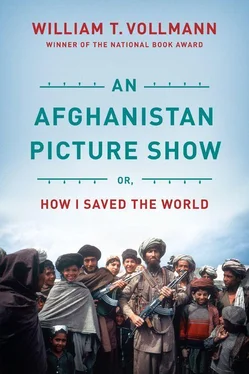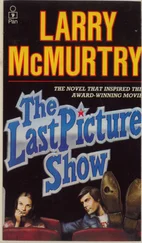TRIUMPHAL RETURN
At pindzuh ‡o’clock in the evening, there was big excitement. — “Poor Man, Poor Man!” they all said. The Young Man didn’t see the guerrilla leader, but he was willing to accept the idea that smoke signals or something had been perceived. A moment later a new man rushed in and cried in English, “No go Afghanistan!”—smiling and spreading his hands. — The Young Man, at whom this was evidently directed, smiled back and said, “Okay.” —What the hell.
The next day Muhammad stayed under his sleeping rug, only poking his head out every now and then like an aquatic mammal surveying the surface of things as it refills its lungs; then Muhammad dove back into his own unconscious.
Whenever the Young Man wrote in his notebook, men came up to him and looked over his shoulder. When they could, they sounded out the words to everyone else, who nodded approvingly.
The Mujahideen grew concerned about their guest’s restlessness. In the early afternoons of those days, they would invite him to go up the river with them. Just out of sight of the village, near a shed they called “the schoolhouse” (it was always shut), was a pleasant slope of alpine meadow studded with smooth warm boulders. On these rocks the Mujahideen would stretch out for hours, eyes closed in bliss. At first the Young Man accompanied them. But he got bored quickly. So he remained inside the malik’s house; he preferred to be bored indoors.
One morning at around eleven a youngish fellow showed up and wanted to take the Young Man somewhere. The Mujahideen had gone out early. — “You from what party?” said the Young Man in his cautious Pushtu. — The other smiled, hesitated. “Gulbuddin,” he said at last. — “Where you go?” said the Young Man. “What you want?” He knew that Gulbuddin and the N.L.F. were at loggerheads. — But the man just smiled and touched his sleeve. — “I stay here,” the Young Man said. — The Gulbuddin man lay in the next charpoy , staring at him. He stared at him for half the day. — To hell with him. To hell with the Afghans. Stupid idea to come here. — When the Mujahideen came back, the Gulbuddin man got up and left.
A great anger was swelling inside the Young Man — the righteous fury of the spoiled child. He said to the Mujahideen, as he said this time every day, “I only want to help you; this is for you, not for me; I’ve been waiting a long time here; my time will soon be up, and then I won’t be able to help you, to send you rupees. Mujahideen— thoughtless, disorganized ; maybe they don’t want me to help them!” §—It had taken hours to learn to say all this (he had had to look up almost every word), but, after all, the Young Man had all the time in the world, and he had been practicing every day. — “Tomorrow,” they soothed him. — “Tomorrow no good,” he replied as usual, “every day you say ‘tomorrow.’ I must go to Afghanistan today or I won’t be able to help you.”
He’d scored this time, though; that he could see. The Mujahideen conferred. Finally Abdullah, the one who knew a little English, said: “Sit down, please.” They all went off.
He waited until his dysentery called him. When he returned from the cemetery, Muhammad was packing the Young Man’s things and telling him to hurry. Evidently, the Young Man reflected, this sort of continual quiet insistence had been what was required all along. Maybe a positively dictatorial European manner, like that of any Great White Man, could even arrange him a skirmish at the appropriate hour … Then the Young Man noticed that they were heading back down the valley toward Parachinar.
“Peshawar?” he said.
“Peshawar.”
They were sorry for him. They kept asking how he was and picking apricots for him to eat. Muhammad carried his pack. When they got to town they told him that the bus was “broken”; he’d have to spend the night in the N.L.F. office; but, as for Peshawar, “Tomorrow!” they told him confidently. At the N.L.F. office they left him.
He sat in the courtyard of the office, surrounded by heroic posters and cartons of biscuits marked for Afghan refugees. The green flag of Islam blew above his head. He was stunned and despondent. An old man came up to him to display his prosthetic arm. The Young Man interrupted, explaining why it was so desperately important for him to go to Afghanistan that day. The old man replied that he was at the American’s service, which meant, no doubt, nothing. — It was very hot now that they were out of the mountains, and the Young Man’s intestinal parasites churned nauseously. There was no bathroom in sight, and no word for it in his English-Pushto kitab . He longed to go home.
POOR MAN
Then Poor Man strode in, smiling. — “You angry?” he said. “Pindzuh minuta.” Five minutes. — His men carried cases of bullets and rocket-launcher shells into the storeroom. Then Poor Man snapped his fingers for the American to get up, and everyone climbed into the back of a covered van. All the other Mujahideen were sitting there. They smiled at him. The van went up the dirt road toward the mountains. It began to rain. Cool rain dripped in through the canopy, refreshing everyone’s face. The Young Man was exhilarated. Around him sat the Mujahideen — twenty of them now — laughing at each other, smoking, cleaning their topaks . The van was full of the pleasant smell of gun oil.
At six that evening they reached the village again. The malik welcomed the Young Man back and embraced him. All the other men were sitting out in the middle of the village, watching the Mujahideen. They were cooking kebabs for the children who were too young to observe Ramazan. The Young Man’s mouth watered. Suleiman, a Mujahid with whom he was especially friendly, offered to buy him one, but the Young Man smiled nobly and said, “You no eat, I no eat.” (It sounded very funny in Pushtu.) — The children of the village surrounded him; he was a novelty again, having been gone for half the day. They wanted him to take pictures of them for the Afghanistan Picture Show. But he said no. He was only taking pictures of the jihad. He was afraid that his film would run out.
The malik invited the Young Man into his house, where, out of sight of the others, he was given a meal. It had not occurred to them that he wanted to be strong like them; how could they know? And if he refused the meal he would give offense. It was lukewarm tea and bread with a bite taken out of it. The malik explained proudly that the Young Man was receiving Poor Man’s own leavings. They tasted good. — An hour later the Mujahideen broke fast together in a grand meal. Poor Man had the Young Man sit at his right side, and spoke to him in his minimal English, to honor him. They were to leave for Afghanistan at 3 a.m.
The Young Man lay awake all night, bitten by bedbugs, excited and terrified. He had been given a charpoy . Beside him, in the next bed, Poor Man coughed and coughed.
POOR MAN’S STATEMENT
“My name is ——— ——. I come from Ningrahar. I am the son of —— and the grandson of ——. ‖I command a group of Afghan Mujahideen. In a recent battle I succeeded in getting some small souvenirs, including the uniform of a Russian brigadier general, which I brought to Peshawar and had sent to Islamabad. This battle took place at a Russian base with a hospital and landing facilities. The fighting lasted for eighteen days, in which period I killed the Russian general and several other people.”
“What tactics have you found to be most successful against the Russians?” the Young Man asked.
“Last year, when we were weaker from a military point of view, we used to perform night operations. Now we have Russian weapons, such as Kalashnikovs, and the battles can take place in the daytime. We can inflict heavy casualties now. We still cannot give them a pitched battle, especially in the daytime, but in our hilly terrain we can dig in with trenches and give them a good fight.”
Читать дальше












